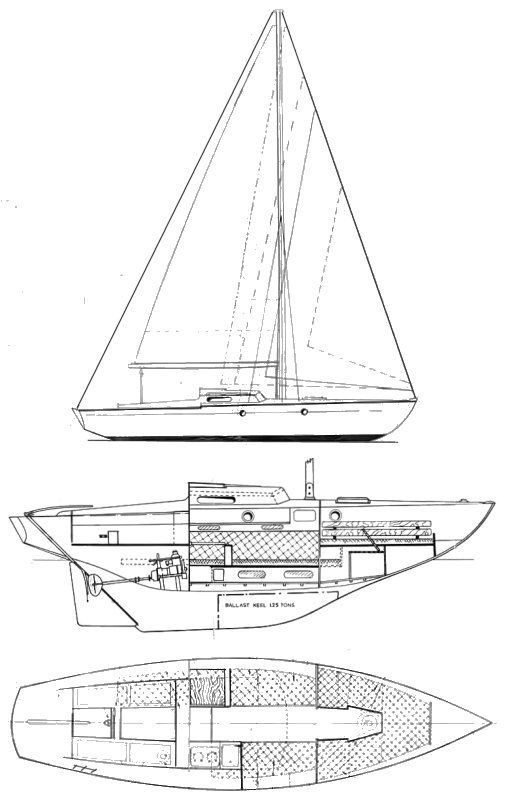The Folkdancer 27 is a robust and versatile 27-foot monohull sailboat, renowned for its solid construction and seaworthy characteristics. Introduced in 1965 by the British boatbuilder Russell Marine Ltd., under the leadership of Des Pollard, this model was designed to offer accessible yet capable sailing to a broad audience. Attributed to the accomplished naval architect Frederick R. Parker, the Folkdancer 27 quickly established itself as a reliable cruiser equally at home in coastal waters, on relaxed passages, or even in competitive racing scenarios.
Folkdancer 27 Information, Review, Specs

- Make
- Model
- Number Built
- Production Year(s)
- 1965 - ??
The Folkdancer 27's lineage traces back through the esteemed Warsash One-Design and Hamble One-Design classes, reflecting a design ethos focused on dependable performance. Its creation in 1965 by Russell Marine Ltd. marked another step in the company's commitment to producing practical and affordable cruising yachts, following their successful Alacrity and Vivacity ranges. Designer Frederick R. Parker, known for his work on both racing and cruising vessels, conceived the Folkdancer 27 to blend good handling with comfortable living, drawing inspiration from the enduring popularity of the Folkboat design. Russell Marine embraced Glass Reinforced Plastic (GRP) construction for the Folkdancer 27, a technology they had adopted early, ensuring consistent and efficient production of sturdy fiberglass hulls and decks. While primarily featuring a long keel for enhanced directional stability, the Folkdancer 27 was also available with a fin keel, offering versatility to suit different sailing preferences.
Sailing Performance and Handling
The Folkdancer 27 exhibits the characteristics of a heavy-displacement, traditional cruiser, with a Displacement to Length ratio of approximately 296. Calculated Her Sail Area to Displacement ratio, around 14.5, suggests that she is not a light-air flyer but is more suited to steady, comfortable progress, particularly as the wind builds. However, her narrow beam and a qualitative assessment of her hull design indicate a "significantly more speedy hull design" compared to many contemporaries, being "slimmer than 97% of all other designs," which hints at a slippery hull form that minimizes wetted surface for her displacement.
A standout feature of the Folkdancer 27's design is her substantial Ballast to Displacement ratio of approximately 55.5%. This high percentage of ballast contributes significantly to her stiffness and stability, enabling her to stand up to a strong breeze and providing a comfortable motion in a seaway. Calculated The long keel configuration enhances directional stability, making her a predictable and easy boat to track, though potentially sacrificing some maneuverability compared to a fin-keel counterpart. Overall, the Folkdancer 27 is known for her good handling characteristics, capable of performing well in a variety of conditions, from leisurely coastal cruising to more ambitious voyages.
Accommodations and Layout
Despite its modest length overall of 27 feet and a beam of 7.5 feet, the Folkdancer 27 was designed to offer reasonably comfortable accommodations for its size. The interior typically features a four- to five-berth layout, providing sleeping arrangements in a relatively plain, functional arrangement. Common layouts likely include a forward V-berth, a head compartment, a compact galley, and a salon with opposing settees that could serve as additional berths. The emphasis was on practicality rather than luxury, aligning with Russell Marine's philosophy of accessible sailing. While specific details on headroom are not available in the provided data, the overall interior finish, typical of boats from this era, would have prioritized robust materials and straightforward construction.
Owner's Perspectives
Owners of the Folkdancer 27 frequently praise its solid fiberglass construction, which contributes to the boat's durability and robust feel on the water. The substantial ballast and long keel design are often cited for providing a comfortable and stable ride, even in less-than-ideal conditions. While specific recurring problems are not widely documented for this model in comparison to more mass-produced boats, like many older vessels, a Folkdancer 27 typically requires ongoing maintenance of its brightwork and original fittings. Some owners note that early models may feature solid fiberglass decks, which can be a point of appreciation for their longevity and resistance to core issues sometimes found in cored decks. The Folkdancer 27 continues to be cherished by those who appreciate its traditional design, steadfast performance, and the enduring legacy of a well-built British cruiser.
Measurements
Construction & Hull
- Construction Material
- Fiberglass (Solid)
- Hull Type
- Monohull Sailboat
- Keel Type
- Long
- Rudder
- 1x —
- Ballast
- 2800 lbs
- Displacement
- 5040 lbs
- Water Capacity
- -
- Fuel Capacity
- -
Engine
- Engine Make
- —
- Engine Model
- —
- Engine Type
- —
- Engine HP
- —
- Engine Count
- 1
- Drive Type
- —
- Fuel Type
- —
Rig & Sails
- Rig Type
- Masthead Sloop
- P (Main Luff)
- -
- E (Main Foot)
- -
- I (Foretriangle Height)
- -
- J (Foretriangle Base)
- -
- Forestay Length (est)
- -
- Main Sail Area
- -
- Foretriangle Sail Area
- -
- Total Sail Area (Reported)
- 264 sqft
- Total Sail Area (Calc)
- -
Dimensions
- LOA
- 27 ft
- LWL
- 19.67 ft
- Beam
- 7.5 ft
- Draft
- 4 ft
- Max Headroom
- -
- Air Draft
- -
Calculations
- Hull Speed
- 5.94 kn
- Pounds per Inch Immersion
- 527.12